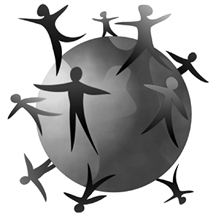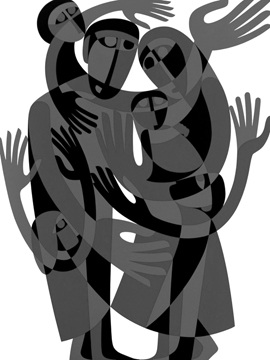Dignity and equality for all
Human Rights Day falls on December 10:
by Pramod DE SILVA
Sri Lanka and the whole world will mark the Human Rights Day on
December 10. It commemorates the day in 1948 the United Nations General
Assembly adopted the Universal Declaration of Human Rights (UDHR).
 This year marks the 61st anniversary of the signing of the Universal
Declaration of Human Rights. This year marks the 61st anniversary of the signing of the Universal
Declaration of Human Rights.
When the General Assembly adopted the Declaration, with 48 states in
favour and eight abstentions, it was proclaimed as a “common standard of
achievement for all peoples and all nations”, towards which individuals
and societies should “strive by progressive measures, national and
international, to secure their universal and effective recognition and
observance”.
What are human rights, also referred to as fundamental rights? Among
the most well-known are freedom of speech or expression, freedom of
movement, the right to information, freedom of worship, freedom from
poverty and hunger, access to health and education and the right to
equality.
In other words, human rights are rights inherent to all human beings,
whatever our nationality, place of residence, gender, national or ethnic
origin, colour, religion, language, or any other status.
As the United Nations puts it, “We are all equally entitled to our
human rights without discrimination. These rights are all inter-related,
inter-dependent and indivisible.”
Universal human rights are often expressed and guaranteed by law, in
the forms of treaties, customary international law, general principles
and other sources of international law.
International human rights law lays down obligations of governments
to act in certain ways or to refrain from certain acts, to promote and
protect human rights and fundamental freedoms of individuals or groups.
Human rights are a two-way process. They entail both rights and
obligations.
International law
According to the UN, “States assume obligations and duties under
international law to respect, to protect and to fulfil human rights. The
obligation to respect means that States must refrain from interfering
with or curtailing the enjoyment of human rights.
The obligation to protect requires States to protect individuals and
groups against human rights abuses.
The obligation to fulfil means that States must take positive action
to facilitate the enjoyment of basic human rights. At the individual
level, while we are entitled to our human rights, we should also respect
the human rights of others.”
Every year, the Human Rights Day focuses on a relevant theme. This
year, the UN and individual countries will focus on non-discrimination.
“All human beings are born free and equal in dignity and rights”.
These first few famous words of the Universal Declaration of Human
Rights established 60 years ago the basic premise of international human
rights law. Yet the fight against discrimination remains a daily
struggle for millions around the globe.
“Our main objective is to help promote discrimination-free societies
and a world of equal treatment for all,” says High Commissioner Pillay
who this year will mark Human Rights Day in South Africa, her native
country.
She notes that the realisation of all human rights - social, economic
and cultural rights as well as civil and political rights - is hampered
by discrimination.
All too often, when faced with prejudice and discrimination,
political leaders, governments and ordinary citizens are silent or
complacent.
“I urge people everywhere to take this issue of discrimination
extremely seriously,” Pillay said. “If allowed to gather momentum,
discrimination and intolerance not only do considerable harm to
individual members of the targeted group, they also divide and harm
society in general.”
Student participation
What better way to spread the word about human rights than starting
it with students? Students from around the world will celebrate Human
Rights Day 2009 by taking part in the first World Human Rights Moot
Competition, organised by the University of Pretoria. Participants will
argue a fictional human rights case on the principle of
non-discrimination before a mock court of high level judges in South
Africa.
 There are many forms of discrimination. There is discrimination
against women in many societies. Discriminatory practices target certain
communities in many countries. Disabled people are discriminated
against. It is a bigger problem than we think. There are many forms of discrimination. There is discrimination
against women in many societies. Discriminatory practices target certain
communities in many countries. Disabled people are discriminated
against. It is a bigger problem than we think.
The best approach is to view human rights through the
non-discrimination lens. It prohibits discrimination on the basis of
race, colour, gender, language, religion, political or other opinion,
national or social origin, disability, property, birth or other status.
Ultimately, it is the society itself that should end discrimination
against certain segments along with the relevant authorities.
Equality for all is one of the main ideals of the UDHR. It is the
foundation of international human rights law, the first universal
statement on the basic principles of inalienable human rights, and a
common standard of achievement for all peoples and all nations.
The Declaration and its core values, including non-discrimination,
equality, fairness and universality, apply to everyone, everywhere and
always.
No country is free of human rights issues. Many powerful nations
ignore human rights issues at home or in areas under their control, and
pass judgement on the human rights issues of other (less developed)
countries.
Different countries can and do have differing views on human rights
in accordance with their cultures. But all countries must adhere to the
basic tenets of the UDHR in principle and in spirit. Laws alone are not
enough.
They should be implemented properly.
Freedom from fear
“The UDHR protects all of us, and it also enshrines the gamut of
human rights. The drafters of the UDHR saw a future of freedom from
fear, but also of freedom from want.
They put all human rights on an equal footing and confirmed human
rights are essential to a life of dignity,” says the UN. It is a living
document that will continue to inspire generations to come. The UDHR,
while being a comprehensive document, does not encompass every aspect of
human rights.
The world evolved many other binding and non-binding laws to protect
the rights of individuals. Among the major highlights are the Convention
on the Rights of the Child and the UN Convention for the Elimination of
All Forms of Discrimination Against Women. Children and women are two
vulnerable segments of society and their rights have been enshrined in
these important Conventions.
The international community has met several times in the last few
decades, especially to discuss the rights of women and children. Sri
Lanka which battled terrorism for three decades has also adopted many
measures to ensure human rights, including the establishment of a Human
Rights Commission. Human rights are an integral part of our lives. No
one can take those rights away from us. Human rights are becoming even
more significant as the world becomes globalised. This brings into focus
the universal nature of human rights. As the world becomes one, human
rights must become a bond which unites humanity in the search for
dignity and equality for all.
“We must work for the full implementation of human rights
on the ground, in a way that affects and improves the lives of the men,
women and children who are all entitled, regardless of their race, sex,
religion, nationality, property or birth, to the realisation of each and
every right set forth in the Universal Declaration.” - UN Secretary
General Ban Ki-moon
“Discrimination lies at the root of many of the world’s
most pressing human rights problems. No country is immune from this
scourge. Eliminating discrimination is a duty of the highest order.” -
UN High Commissioner for Human Rights, Navanethem Pillay
|

